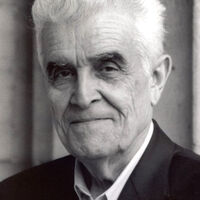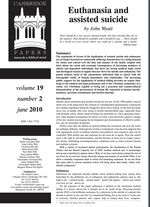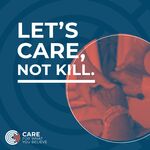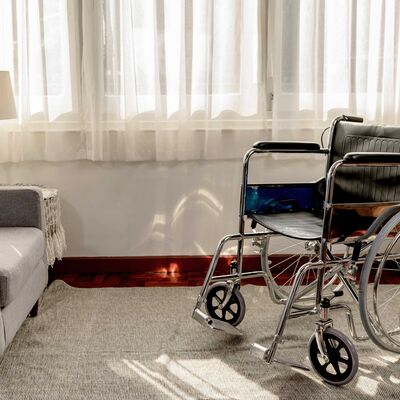
Life

Life
All life has intrinsic value and dignity – regardless of its condition. We recognise how immensely difficult it is to suffer or to see a loved one enduring pain, but, as Christians, we are called to protect those who are vulnerable and assist people to live – not to commit suicide. CARE therefore strongly opposes a change to the law on assisted suicide in the UK, and we work to support truly compassionate approaches to care at the end of life being articulated in our parliaments and assemblies.
We want to see a society that truly upholds the dignity of every life and where laws protect those who are vulnerable – particularly those who would feel pressure to end their lives for fear of being a burden on others.
Together we can fight against attempts to change the law on assisted suicide, ensuring that vulnerable people are protected. We can advocate for excellent palliative care, so that those at the end of their lives have healthcare that focuses on relieving and preventing suffering.

We should not forget that laws are more than just regulatory instruments. They also send powerful social messages. An assisted dying law sends the subliminal message, however unintended by legislators, that if we are terminally ill taking our own lives is something we should consider.
1. We need it - 'the compassion argument'. Supporters of assisted suicide believe that allowing people to ‘die with dignity’ is kinder than forcing them to continue their lives with suffering.
2. We want it - 'the autonomy argument'. Some believe that every patient has a right to choose when to die.
3. We can control it - 'the public policy argument'. Proponents believe that assisted suicide can be safely regulated by government legislation.
1. Alternative treatments are available, such as palliative care and hospices. We do not have to kill the patient to kill the symptoms. Nearly all pain can be relieved.
2.There is no ‘right’ to be killed and there are real dangers of ‘slippery slopes’. Opening the doors to voluntary euthanasia and assisted suicide could lead to non-voluntary and involuntary euthanasia, by giving doctors the power to decide when a patient’s life is not worth living. In the Netherlands in 1990 around 1,000 patients were killed without their request.
3. We could never truly control it. Reports from the Netherlands, where euthanasia and physician-assisted suicide are legal, reveal that doctors do not always report it.
4. The assumption that patients should have a right to die would impose on doctors a duty to kill, thus restricting the autonomy of the doctor. Also, a ‘right to die’ for some people might well become a ‘duty to die’ by others, particularly those who are vulnerable or dependent upon others.

“The experience of death is going to get more and more painful, contrary to what many people believe. The forthcoming euthanasia will make it more rather than less painful because it will put the emphasis on personal decision in a way which was blissfully alien to the whole problem of dying in former times. It will make death even more subjectively intolerable, for people will feel responsible for their own deaths and morally obligated to rid their relatives of their unwanted presence. Euthanasia will further intensify all the problems its advocates think it will solve.”
Here are a range of resources to help you dig deeper on the issue of assisted suicide.

Discover 10 things we think everyone should know about assisted suicide.
Read more
One of the most powerful ways to respond to pressure for assisted suicide is to highlight stories where people have experienced high quality end of life care. Click below to read four astonishing and moving testimonies.
Read more
In this superb article, Prof John Wyatt, a former NHS Consultant with more than 30 years experience takes a long, hard look at the Assisted Dying Bill put forward by Baroness Meacher. John explores the impulses behind the push for assisted suicide and highlights the many flaws with the Bill.
Read more
One of our most fundamental values as a society—what makes us different from communism or totalitarianism—is that we value individual lives. According to an Australian Liberal MP, speaking out against a proposed assisted suicide bill in Queensland, euthanasia laws will ‘turn that on their head.’ In this article, Jamie Gillies unpacks why this discussion holds important lessons for the UK.
Read More
CARE supports quality palliative care for everyone. But what is it? Does it even work and why is it so important? James Mildred investigates.
Discover more
Members of the CARE Team answer your questions about assisted suicide and euthanasia in a wide-ranging discussion.
Watch
Watch Tony's Story, the story of Nola and her husband Tony, who died after a two-year struggle with Alzheimer's. At one point in his last few months of life, Tony didn't feel he could go on any longer. .
Watch
In this episode of the CAREcast, James and Dr Gillian Wright discuss some of the common arguments in favour of assisted suicide and how we can effectively respond.
Watch
The author Dr Kathryn Mannix explains what death and dying really looks like and helpfully explains more about the power of palliative care.
listen
Listen to this episode of the CARECast, where CARE's James Mildred explains why he's opposed to euthanasia and assisted suicide.
Listen
At CARE we believe it's better to care, not to kill. We want to pray for people approaching the end of their lives and for medical professionals who care for them. This resource will help you pray against euthanasia and for hospices and quality palliative care.
Pray with us
Professor John Wyatt
The increasing public support for the legalisation of medical killing provides an urgent challenge to the medical and legal professions and to the Christian community as a whole. Are Christians capable of living out a practical and countercultural demonstration of the preciousness of human life expressed in human interdependence, personal commitment and burden-sharing?
Read the paper
CARE
In any campaign, it is always important to properly understand the arguments advanced by those you oppose.
read more
by Dr Peter Saunders
This booklet by Dr. Peter Saunders, former Chief Executive of the Christian Medical Fellowship, explores what the Bible has to say about euthanasia and assisted suicide:
download
by Chris Buttenshaw
This booklet is written by Chris Buttenshaw, a member of CARE's Public Affairs team. It gives an in-depth Biblical discussion of suffering, life and death in the context of faith in a sovereign God who is supremely in control, whose love and attention does not waiver according to circumstances (Psalm 136) and whose ways are beyond our understanding (Isaiah 55:8-9; Job 36:26).
download
Explore biblical views on end of life issues.
Find out more
Campaign groups have raised their concerns with MSPs over a new proposed Bill on assisted suicide in Scotland, suggesting it poses a significant threat to disabled individuals.
Read article









You matter because you are you, and you matter to the end of your life. We will do all we can not only to help you die peacefully, but also to live until you die.
Together we can make a difference shaping our culture and society. Here are three things you can do right now…
We believe God has called us to value the dignity and worth of all human beings, no matter the quality of their lives. Here are some prayer points to help you pray.
Submit your response to the Public Inquiry into the current law on assisted suicide
Read our arguments for and against assisted suicide